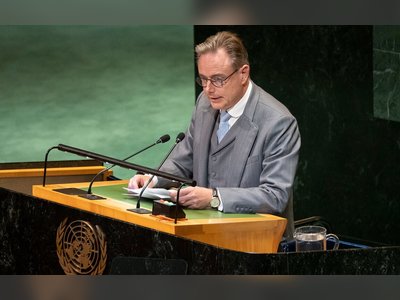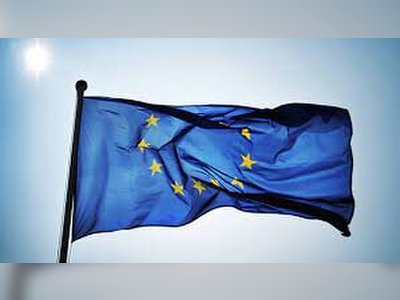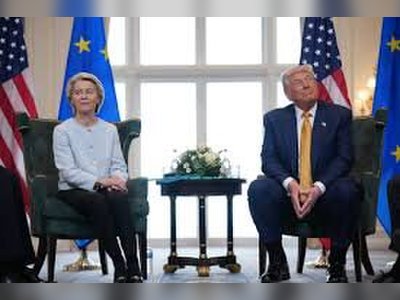
Germany Prepares for Pivotal Bundestag Elections Amid Rising Political Fragmentation
The 2025 election marks a significant departure from traditional political dynamics as the German electorate prepares to vote amidst a climate of shifting party allegiances and increased ultra-right influence.
Brussels – Germany is set to hold elections on February 23, a moment deemed to be the least 'German' in the nation's recent electoral history.
Once hailed as a bastion of political stability, Germany's political landscape is now exhibiting signs of strong fragmentation, a shift from its reliance on centrist and Social Democratic parties towards the rising influence of nationalist ultra-right factions and a revived radical left.
Voters will head to the polls to renew the Bundestag, the lower house of its legislature.
Polling data suggests that the Union parties, namely the Christian Democratic Union (Christlich Demokratische Union Deutschlands, CDU) and the Christian-Social Union (Christlich-Soziale Union in Bayern, CSU), are poised to secure victory, with support estimated around 30 percent, a range depending on the latest surveys.
Consequently, Friedrich Merz, CDU leader and former protégé of Angela Merkel, is anticipated to assume the role of next federal chancellor (Bundeskanzler).
Merz's leadership has seen a significant transformation of the CDU, introducing a notably conservative stance especially regarding immigration policy.
This shift sparked controversy in January when Merz attempted to align with ultra-right factions to push through an immigration restriction bill, which ultimately failed by a narrow margin.
This initiative triggered widespread public protests against the perceived erosion of centrist political consensus.
Conversely, the Social Democratic Party (SPD) is projected to experience its worst electoral outcome since World War II, with current estimates showing a drop in support to between 15 and 16 percent, marking a significant decline from their first-place finish four years prior at 25.7 percent.
The SPD's term in government has been overshadowed by intra-coalition disputes within the ‘Semaphore Coalition,’ which also included the Greens and the Free Democratic Party (FDP), diminishing their executive efficacy.
Outgoing Chancellor Olaf Scholz has also suffered a decline in personal political capital.
The SPD’s leadership crisis is further illustrated by the withdrawal of Boris Pistorius, the outgoing defence minister who had negotiated a strong personal approval rating, from the chancellor candidacy race.
The far-right Alternative für Deutschland (AfD) is projected to secure historic support with estimates ranging from 20 to 21 percent, marking a significant ascent for the party since its foundation in 2013. The AfD, recognized for its ultranationalist and pro-Russian rhetoric, is currently under scrutiny from the Federal Office for the Protection of the Constitution due to its classification as a suspected right-wing extremist organization.
Their campaign has capitalized on an increasingly vocal anti-immigration sentiment, especially in the wake of recent violent incidents across Germany.
The AfD’s efforts to mainstream its narrative have been aided by interactions with American political figures, further legitimizing its stance in German politics.
The Greens, expected to finish in a distant third place, have seen their backing drop from nearly 15 percent in the previous elections to approximately 13-14 percent.
Under the leadership of Robert Habeck, the party has struggled with criticisms over its climate policies during its tenure in the government, which have been perceived as neglectful of social and economic repercussions.
Interestingly, Die Linke, historically in decline, appears to experience a resurgence in support, attributed to a revival in party leadership and a new focus on issues resonating with younger voters.
The radical left's current prospects are estimated to range between 6 and 9 percent.
Additionally, the FDP faces a precarious electoral standing, with projections suggesting it may fail to meet the five-percent threshold due to its turbulent experience in the previous coalition government.
Sahra Wagenknecht's newly formed party, Bündnis Sahra Wagenknecht (BSW), combines elements of progressive tradition with radical right undertones, capturing around 4.5 percent in polls.
The German electoral system remains complex, incorporating a dual voting mechanism aimed at ensuring proportional representation.
Voters will select candidates in one of 299 constituencies through a first vote, while a second vote is cast for party lists, impacting overall representation in the Bundestag.
Importantly, a five percent national threshold for parties is in place, with specific exemptions.
As the electoral process unfolds, the outcome will significantly influence Germany’s future political alliances and governance structure, compelling leaders to navigate a fragmented and diverse political terrain.
Once hailed as a bastion of political stability, Germany's political landscape is now exhibiting signs of strong fragmentation, a shift from its reliance on centrist and Social Democratic parties towards the rising influence of nationalist ultra-right factions and a revived radical left.
Voters will head to the polls to renew the Bundestag, the lower house of its legislature.
Polling data suggests that the Union parties, namely the Christian Democratic Union (Christlich Demokratische Union Deutschlands, CDU) and the Christian-Social Union (Christlich-Soziale Union in Bayern, CSU), are poised to secure victory, with support estimated around 30 percent, a range depending on the latest surveys.
Consequently, Friedrich Merz, CDU leader and former protégé of Angela Merkel, is anticipated to assume the role of next federal chancellor (Bundeskanzler).
Merz's leadership has seen a significant transformation of the CDU, introducing a notably conservative stance especially regarding immigration policy.
This shift sparked controversy in January when Merz attempted to align with ultra-right factions to push through an immigration restriction bill, which ultimately failed by a narrow margin.
This initiative triggered widespread public protests against the perceived erosion of centrist political consensus.
Conversely, the Social Democratic Party (SPD) is projected to experience its worst electoral outcome since World War II, with current estimates showing a drop in support to between 15 and 16 percent, marking a significant decline from their first-place finish four years prior at 25.7 percent.
The SPD's term in government has been overshadowed by intra-coalition disputes within the ‘Semaphore Coalition,’ which also included the Greens and the Free Democratic Party (FDP), diminishing their executive efficacy.
Outgoing Chancellor Olaf Scholz has also suffered a decline in personal political capital.
The SPD’s leadership crisis is further illustrated by the withdrawal of Boris Pistorius, the outgoing defence minister who had negotiated a strong personal approval rating, from the chancellor candidacy race.
The far-right Alternative für Deutschland (AfD) is projected to secure historic support with estimates ranging from 20 to 21 percent, marking a significant ascent for the party since its foundation in 2013. The AfD, recognized for its ultranationalist and pro-Russian rhetoric, is currently under scrutiny from the Federal Office for the Protection of the Constitution due to its classification as a suspected right-wing extremist organization.
Their campaign has capitalized on an increasingly vocal anti-immigration sentiment, especially in the wake of recent violent incidents across Germany.
The AfD’s efforts to mainstream its narrative have been aided by interactions with American political figures, further legitimizing its stance in German politics.
The Greens, expected to finish in a distant third place, have seen their backing drop from nearly 15 percent in the previous elections to approximately 13-14 percent.
Under the leadership of Robert Habeck, the party has struggled with criticisms over its climate policies during its tenure in the government, which have been perceived as neglectful of social and economic repercussions.
Interestingly, Die Linke, historically in decline, appears to experience a resurgence in support, attributed to a revival in party leadership and a new focus on issues resonating with younger voters.
The radical left's current prospects are estimated to range between 6 and 9 percent.
Additionally, the FDP faces a precarious electoral standing, with projections suggesting it may fail to meet the five-percent threshold due to its turbulent experience in the previous coalition government.
Sahra Wagenknecht's newly formed party, Bündnis Sahra Wagenknecht (BSW), combines elements of progressive tradition with radical right undertones, capturing around 4.5 percent in polls.
The German electoral system remains complex, incorporating a dual voting mechanism aimed at ensuring proportional representation.
Voters will select candidates in one of 299 constituencies through a first vote, while a second vote is cast for party lists, impacting overall representation in the Bundestag.
Importantly, a five percent national threshold for parties is in place, with specific exemptions.
As the electoral process unfolds, the outcome will significantly influence Germany’s future political alliances and governance structure, compelling leaders to navigate a fragmented and diverse political terrain.
AI Disclaimer: An advanced artificial intelligence (AI) system generated the content of this page on its own. This innovative technology conducts extensive research from a variety of reliable sources, performs rigorous fact-checking and verification, cleans up and balances biased or manipulated content, and presents a minimal factual summary that is just enough yet essential for you to function as an informed and educated citizen. Please keep in mind, however, that this system is an evolving technology, and as a result, the article may contain accidental inaccuracies or errors. We urge you to help us improve our site by reporting any inaccuracies you find using the "Contact Us" link at the bottom of this page. Your helpful feedback helps us improve our system and deliver more precise content. When you find an article of interest here, please look for the full and extensive coverage of this topic in traditional news sources, as they are written by professional journalists that we try to support, not replace. We appreciate your understanding and assistance.











